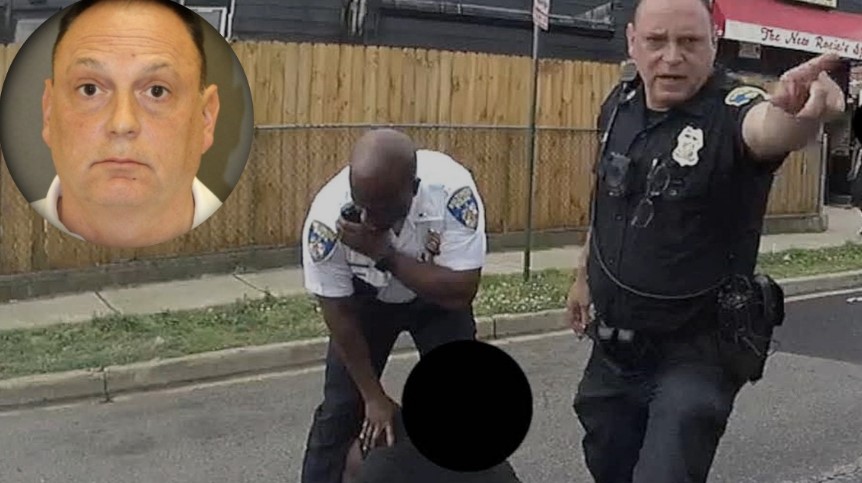
By Stephen Janis and Taya Graham,
Special to the AFRO
From the onset of the Nov. 14 sentencing hearing for former Baltimore police sergeant Ethan Newberg, the city’s criminal justice system seemed poised to close the book on what the judge had termed his “old school” style of policing.
Newberg had pleaded guilty to nine misdemeanor counts of misconduct in office, all stemming from a series of false arrests and unwarranted detainments caught on body camera. It was the type of aggressive policing that the U.S. Justice Department declared unconstitutional and racist in a 2016 report, and prosecutors argued was no longer acceptable.
“When he was out on the street he showed no mercy. He said, ‘Take your charge,’” Steve Trostle, the prosecuting attorney said. “It’s time he took his own advice.”
Prosecutors recommended 36 months of jail time, arguing that the judge needed to send a message to deter future civil rights violations. A Fedex driver who Newberg illegally arrested testified that the encounter still haunted him. Even the judge remonstrated Newberg, declaring his tactics a “thing of the past.”
“It doesn’t just sow distrust of the system,” Circuit Court Judge Robert Taylor said. “It sows contempt of the system.”
But in the end, the justice system blinked, and the assertion that the city had truly moved on from aggressive, unconstitutional policing remained in question.
Newberg received no jail time. Instead he was sentenced to six months of home detention and two years supervised probation.
His defense attorney also revealed Newberg was employed by the police department for the entirety of four years while the case progressed. He retired this past July with full pension benefits, courtesy of the taxpayers that prosecutors noted “were paying his salary” while he abused them.
The sentencing was the result of a guilty plea by Newberg for a series of nine illegal arrests that occurred between 2018 and 2019. Some victims were handcuffed and thrown against a wall. Others were threatened with arrest and forced to apologize for simply exercising their constitutional rights. At least five were jailed.
Prior to sentencing Newberg expressed little in the way of remorse. Instead he blamed social media and even his former employer for magnifying a series of arrests he argued was not representative of his 28-year career.
“Unfortunately, the press conference given by the police commissioner and the state’s attorney’s office and social media portrayed me in a very negative manner,” Newberg said in court.
“My career has been defined by a handful of videos,” he added.
Despite his protestations, for the most part, the videos in question have remained secret.

After the police department released one video depicting Newberg’s arrest of a man who criticized him for placing a suspect on a wet sidewalk, the BPD and the state’s attorney’s office have turned down a series of public information requests to release the remaining footage. Both agencies cited the exemption that the case was still under investigation, despite the fact that Newberg had pleaded guilty at the time of the request.
Even the Maryland Public Information Act ombudsman sided with the law enforcement agencies and speculated releasing the videos to the public could adversely affect his sentencing.
Looming over the hearing was the aforementioned debate over how the city should be policed.
Newberg defended the tactics which led to his charges, saying cops on the street were restrained by the fear of prosecution.
“Officers are not being proactive on crime in fear of making the wrong decision…and they could be standing where I stand,” Newberg said.
A recent survey of the community perception of police conducted by The Morgan State University Institute for Urban Research shows the dilemma facing the city as it tries to turn the page on the aggressive policing that Newberg practiced.
The team of investigators have been monitoring the progress inside the BPD since it entered a consent decree with the Department of Justice. The research team, led by Dr. Natasha Pratt Harris, interviewed 414 city residents, asking a series of questions about the perception of crime and effectiveness of the department.
Approximately 81 percent of the random sample thought the city had a high crime rate. But roughly 70 percent of the same set of residents either disagreed or strongly disagreed that Baltimore police solve crime quickly.
“They don’t treat the citizens with dignity and they don’t treat us like they care for us,” one of the respondents told investigators.
“They got a long way to go, man.”
The post Newberg sentence casts doubt on Baltimore’s commitment to less aggressive policing appeared first on AFRO American Newspapers .










